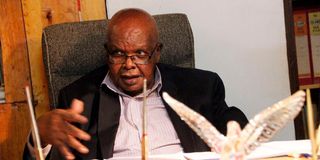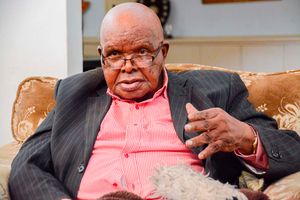
Professor Bethwel Ogot at his home in Gem Yala, Siaya County on March 17, 2016.
In his citation during the African Studies Association Distinguished Africanist Award presentation to Bethwell Allan Ogot in Houston, USA, in 2001, renowned Africanist David Cohen said of Ogot: “I know of no scholar of Africa who has contributed more than he has in the building of new institutional foundations to support the Africanist scholarship and to the continuous generation of lively and challenging scholarship in Africa.”
This was an acknowledgment of Bethwell Allan Ogot’s profound impact on African studies, both within the continent and internationally. As we mourn him, it is good to revisit his massive autobiography, My Footprints on the Sands of Time, published in 2003, because it is here that he tells of his contribution to African historiography and academic institutions.
Ogot’s memoir might as well be termed an academic autobiography to the extent that it is conscious of itself as an intellectual project that constructs our access to the past and increases our understanding not only of history but, importantly, of the writing of history.
His journey to the intellectual summit begins when he is admitted to Makerere College for a Diploma course in Education with a subject combination of Mathematics and History, “a combination that was condemned by my academic advisors as odd or stupid.” He would later abandon Mathematics for History, and this autobiography is mainly about his role in the development of African history as a subject of study in East Africa and Africa in general.
It is also about his role in building indigenous institutions, which he saw as a way of restoring agency to Africans that colonialism had suppressed. He would prominently play this role as the editor of the UNESCO project, ‘General History of Africa’ (GHA) project, which he also helped to found.
For Ogot, the need to decolonise African history was justified on the grounds that: “African history was for the most part, seen as the history of Europeans in Africa - a part of the historical progress and development of Western Europe and an appendix of the national history of the metropolis. It was argued at the time that Africa had no history because history begins with writing and, thus with the arrival of the Europeans.”
Ogot demonstrates how Western scholarship linked African historiography with the “colonial period and its own official historiography, with prejudices, acquired and disseminated as historical knowledge, and with Eurocentric assumptions and arrogant certainty.” Just like in the literary projects that challenged the Western construction of Africa as “one long night of savagery,” (Achebe) the challenge to imperial historiographical hegemony was part of the decolonization process.
The ‘General History of Africa’ project was, according to Casper Andersen, a “scholarly undertaking but was at the same time regarded as a frame for the enactment of national and transnational memory political agendas that shifted during the project spanned. In a sense, ideological factors underpinning the politics of national liberation and nation building determined the directions of disciplines such as history and literature significantly.
What is interesting is that as early as 1950, Ogot and other students in Makerere were already confronting decolonial issues even if they did not couch them in the grammar of contemporary decolonial scholarship. Questions and complexities of writing African literature in mother tongues, which would preoccupy Ngũgĩ wa Thiong’o and his generation in the late 1970s as part of their decolonization agenda, were already urgent questions for the Makerere Society of Vernacular Literature, where Ogot was a member and the Assistant Editor of African Literature, the society’s journal.
Ogot’s early interest in the history of precolonial Africa was premised on his conviction that although there were no written records of such pasts, the examination of the validity of traditional sources would be a project worth undertaking as a first step in understanding that past and liberating it from the Africa of Hegel which lay “beyond the day of self-conscious history” and “enveloped in the dark mantle of Night.” (Hegel). As he explains in his autobiography, Ogot, who would later be joined by other students of precolonial Africa like G.S Were, Ahmed Salim, and Godfrey Muriuki, was interested in countering colonial history in Africa which, is “the product of the West in its actions upon others and which, conceived this way, silences articulation of alternative histories.
Yet, regarding the controversial historiography of Kenya’s liberation and the role of Mau Mau, historians working on precolonial histories did not lack critics. For example, in a rare case of intertextuality, Ngũgĩ wa Thiong’o, in his novel Petals of Blood through Karega, the intellectual character of the novel, makes actual reference to three Kenyan historians (Ogot, Muriuki, Were, and Ochieng) whom he then lampoons for being defenders of imperialist historiography.
Without referring to these charges, Ogot alludes to his efforts to deconstruct the very imperialist distortions of African history of which Ngũgĩ was accusing him. In December 1961, upon invitation by the International African Institute in London, he attended an international conference in Dakar, Senegal, that was meant to discuss “the meaning of African history to contemporary Africans” and the “legitimate role of “historical imagination.” For the first time, this conference brought together African historians and other practitioners from around the world.
It was also the first time an international conference was specifically convened to discuss the history of the continent. It was here that Ogot met for the first time with other African scholars like Jacob Adeniyi Ajayi of Nigeria, Sheikh Anta Diop of Senegal, and Joseph Kizerbo of Burkina Faso with whom he would collaborate in the future, especially in the UNESCO project.
Ogot argues that in this conference they successfully put up a case “against ethno-history that was being championed by anthropologists and some Franco-phones on the basis that Africa had no history that predated the colonial period except ethno-history. We buried African ethno-history in Dakar, and henceforth, no scholar worth its salt ever again referred to African history as ethno-history.”
When appointed a lecturer in Makerere, he pursued similar decolonial projects by coming together with a minority group of scholars that demanded decolonisation of the history curriculum to give centrality to research on African history using methods and sources unencumbered by historiography as defined by European historians. This is what Ngũgĩ wa Thiong’o and colleagues would be doing for African literature a decade later in what has come to be known as the Nairobi revolution, that is, the abolition of the English department and its replacement with the Department of Literature with a heavy Afrocentric focus at the University of Nairobi.
In a sense, then, Ngũgĩ’s categorisation of Ogot as an “imperialist historian” stems from a distaste for Ogot’s alternative perspective, which emphasises the diverse struggles for liberation within Kenyan communities rather than solely emphasizing the conventional Mau Mau narrative of the independence struggle.
Prof Peter Simatei teaches literature at Moi University and is the Director of Moi University African Cluster Centre of Excellence in African Studies. [email protected]




